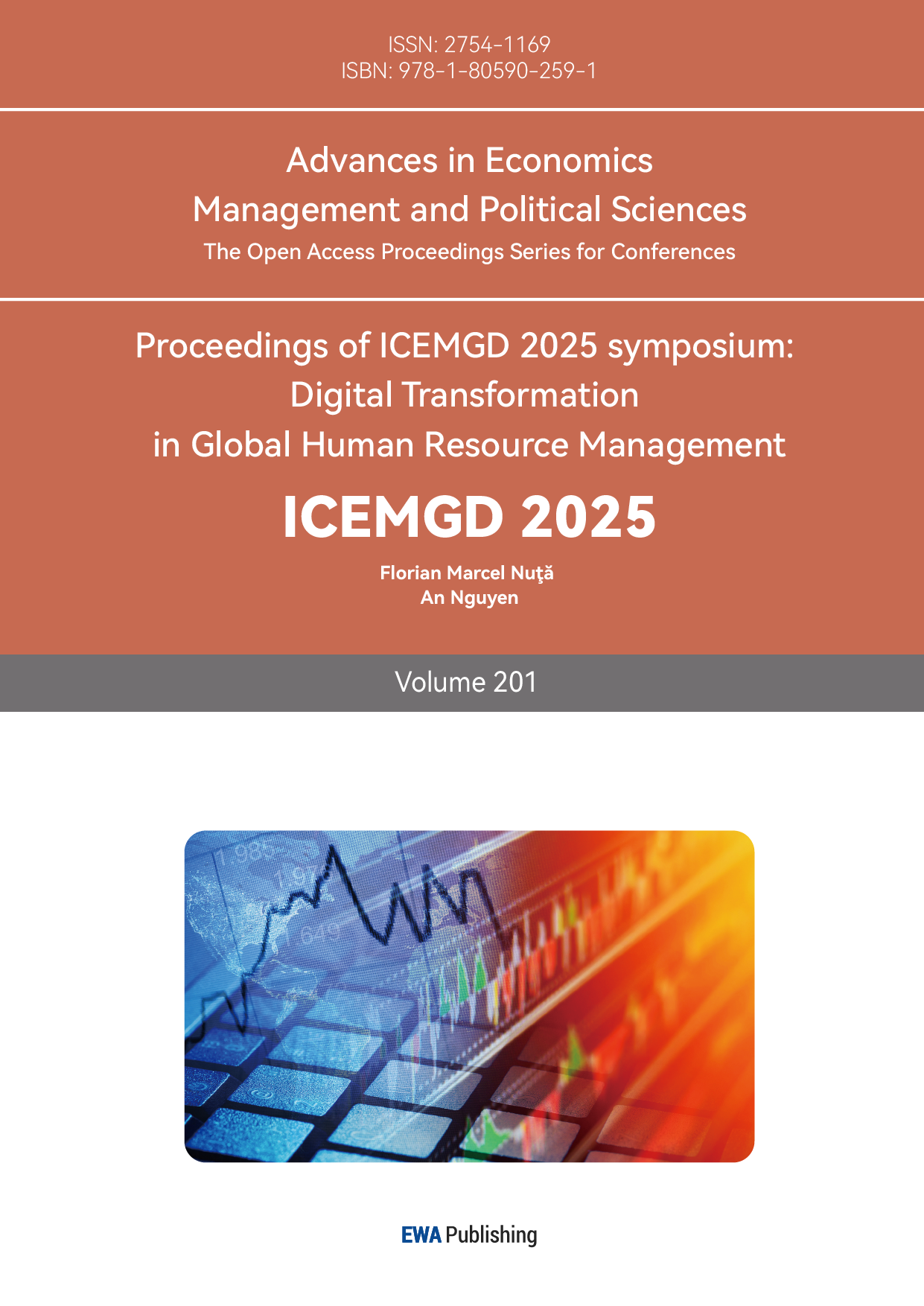References
[1]. Bi, S., & Zhang, L. (2010). Analysis of corporate greenwashing behavior. Research on Financial and Economic Issues, (10), 97-100.
[2]. Delmas, M. A., & Burbano, V. C. (2011). The Drivers of Greenwashing. California Management Review, 54(1), 64–87. https: //doi.org/10.1525/cmr.2011.54.1.64
[3]. Du, X. (2015). How the Market Values Greenwashing? Evidence from China. Journal of Business Ethics, 128(3), 547–574. https: //doi.org/10.1007/s10551-014-2122-y
[4]. Zhang, L., Li, D., Cao, C., & Huang, S. (2018). The influence of greenwashing perception on green purchasing intentions: The mediating role of green word-of-mouth and moderating role of green concern. Journal of Cleaner Production, 187, 740–750. https: //doi.org/10.1016/j.jclepro.2018.03.201
[5]. Zhao, C., Wang, W., & Li, X. (2021). How Does Digital Transformation Affect the Total Factor Productivity of Enterprises?. Finance & Trade Economics, 42(07), 114-129. doi: 10.19795/j.cnki.cn11-1166/f.20210705.001.
[6]. Tian, X., & Li, R. (2022). Digital Technology Empowers the Transformation and Development of Real Economy: An Analysis Framework Based on Schumpeter's Endogenous Growth Theory. Journal of Management World, 38(05), 56-73. doi: 10.19744/j.cnki.11-1235/f.2022.0076.
[7]. Chen, D., & Hu, Q. (2022). Corporate Governance Research in the Digital Economy: New Paradigms and Frontiers of Practice. Journal of Management World, 38(06), 213-240. doi: 10.19744/j.cnki.11-1235/f.2022.0088.
[8]. Wang, C. (2021). Research on the Effecting Mechanism of Digital Transformation on Corporation Innovation Performance. Contemporary Economic Management, 43(03), 34-42. doi: 10.13253/j.cnki.ddjjgl.2021.03.005.
[9]. Qi, Y., & Xiao, X. (2020). Transformation of Enterprise Management in the Era of Digital Economy. Journal of Management World, 36(06), 135-152+250. doi: 10.19744/j.cnki.11-1235/f.2020.0091.
[10]. Ni, K., & Liu, X. (2021). Digital Transformation and Enterprise Growth: Logic and Practice of China's Capital Market. Business and Management Journal, 43(12), 79-97. doi: 10.19616/j.cnki.bmj.2021.12.005.
[11]. Lu, Z., Lin, Y., & Li, Y. (2023). Does corporate engagement in digital transformation influence greenwashing? Evidence from China. Finance Research Letters, 58, 104558. https: //doi.org/10.1016/j.frl.2023.104558
[12]. Wu, F., Hu, H., Lin, H., & Ren, X. (2021). Enterprise Digital Transformation and Capital Market Performance: Empirical Evidence from Stock Liquidity. Journal of Management World, 37(07), 130-144+10. doi: 10.19744/j.cnki.11-1235/f.2021.0097.
[13]. Yuan, C., Xiao, S., Geng, C., & Sheng, Y. (2021). Digital Transformation and Division of Labor between Enterprises: Vertical Specialization or Vertical Integration. China Industrial Economics, (09), 137-155. doi: 10.19581/j.cnki.ciejournal.2021.09.007.
[14]. Wang, J., & Cao, Z. (2024). Can Digital Transformation Restrain “Greenwashing” Behavior of Enterprises. Journal of Hunan University(Social Sciences), 38(02), 58-67. doi: 10.16339/j.cnki.hdxbskb.2024.02.008.
[15]. Xu, J., Liao, H., & Yang, J. (2022). Government subsidies and firms' pollution emissions: empirical research based on micro-firms. Industrial Economics Research, (04), 30-45.doi: 10.13269/j.cnki.ier.2022.04.007.
[16]. Yao, H., & Li, W. (2024). Has Digital Transformation Suppressed the Greenwashing of Enterprises?. Journal of Huaqiao University(Philosophy & Social Sciences), (06), 52-69. doi: 10.16067/j.cnki.35-1049/c.2024.06.011.
[17]. Jin, Y., Wen, W., & He, Y. (2022). Impact of Digital Transformation on Corporate Green Innovation: Evidence from China’s Manufacturing Listed Companies. Finance and Trade Research, 33(07), 69-83. doi: 10.19337/j.cnki.34-1093/f.2022.07.006.
[18]. Tan, Y., Tian, X., Zhang, X., & Zhao, H. (2014). Privatization and innovation: evidence from a quasi-natural experience in china. SSRN Electronic Journal. https: //doi.org/10.2139/ssrn.2433824



